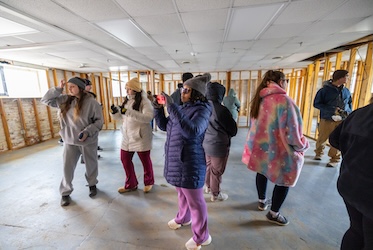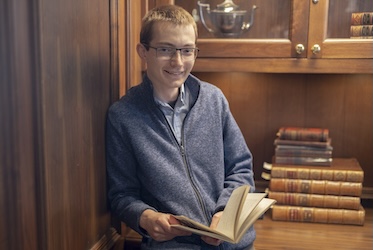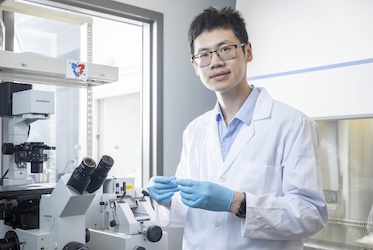
Engineering professors collaborate with Wellstar to decontaminate N95 respirator masks
KENNESAW, Ga. | Jun 19, 2020
Faced with a shortage of N95 respirator masks used heavily by healthcare professionals amidst the coronavirus pandemic, a team of Kennesaw State University engineers assisted Wellstar Health System nurse leaders, operations, facility engineering, sterile processing and a project manager in developing an operational plan for their newly built UVGI room to decontaminate masks for reuse.
Using a process known as ultraviolet germicidal irradiation (UVGI), Kennesaw State professors Andrew Hummel and Awatef Ergai and recent graduate Austin Crawford, lent their expertise to assist Wellstar Health System in creating an operational plan designed to disinfect N95 respirator masks. The UVGI process works by exposing the masks to ultraviolet C (UVC) light, which is absorbed by DNA and protein molecules to effectively kill any contaminants with the proper amount of exposure.
“Being entrenched in this pandemic has caused us to look at some innovative and creative solutions to meet the anticipated supply need,” said LeeAnna Spiva, assistant vice president of nursing operations and practice at Wellstar.

Sharlene Toney, executive director for professional practice, added the collaborative work is paramount in keeping front line healthcare team members safe.
Leveraging an existing relationship with KSU’s Wellstar College of Health and Human Services, Spiva contacted the University in March seeking help in outlining a process using UVGI. She was introduced to Hummel, an assistant professor of nuclear engineering in the Southern Polytechnic College of Engineering and Engineering Technology. Crawford and Hummel helped Wellstar think through opportunities for failures, such as electricity loss, etc. The room, which measures 14-by-20 feet is filled with 11 UVC light bulbs at Kennestone Hospital, where more than 100 masks at a time can be decontaminated. With the equipment in place, the KSU team ran calculations in order to quantify the amount of UV exposure in the room in order to achieve decontamination levels.
“There is a great deal of satisfaction in knowing that we can use our skills to engineer a solution that can better the lives of frontline healthcare professionals who work tirelessly to fight this virus,” Hummel said. “We are pleased to arrive at a solution that is both safe and cost effective.”
With the UVGI room at Kennestone Hospital in place, Wellstar professionals turned to Ergai to help improve process flow and eliminate any room for error. Having completed postdoctoral work at the Healthcare Systems Engineering Institute in Boston, Ergai said she was uniquely positioned to consult in a medical setting. She worked with the Wellstar team to identify ways to hang the masks throughout the UGVI room effectively and identified potential process failures that the Wellstar team addressed.
“I’ve been mainly interested in designing a system that would work for the healthcare systems without adding any unnecessary steps and making it streamlined without any work-arounds,” said Ergai, who teaches industrial and systems engineering. “This is particularly important for high-stress times where our healthcare professionals are extremely exhausted.”

The collaborative efforts have led to two Institutional Review Board (IRB) research studies to generate new knowledge regarding COVID-19 pandemic in the healthcare environment.
Using the same approach as the UVGI room at Kennestone Hospital, a UVGI box has since been installed at Wellstar Cobb Hospital with Hummel’s guidance.
“Kennesaw State’s engineering faculty were collaborative partners and instrumental in defining safe filtration standards and processes,” said Roseann Pena, vice president operations at Wellstar Kennestone.
– Travis Highfield
Photos submitted
Related Stories

Kennesaw State architecture, engineering students reimagine Asheville's devastated River Arts District

First-year Kennesaw State student, author recognized as versed local historian

KSU researcher harnessing digital twin technology to improve heart care

Kennesaw State student leverages Double Owl Pathways program to accelerate career path
A leader in innovative teaching and learning, Kennesaw State University offers undergraduate, graduate, and doctoral degrees to its more than 47,000 students. Kennesaw State is a member of the University System of Georgia with 11 academic colleges. The university’s vibrant campus culture, diverse population, strong global ties, and entrepreneurial spirit draw students from throughout the country and the world. Kennesaw State is a Carnegie-designated doctoral research institution (R2), placing it among an elite group of only 8 percent of U.S. colleges and universities with an R1 or R2 status. For more information, visit kennesaw.edu.















